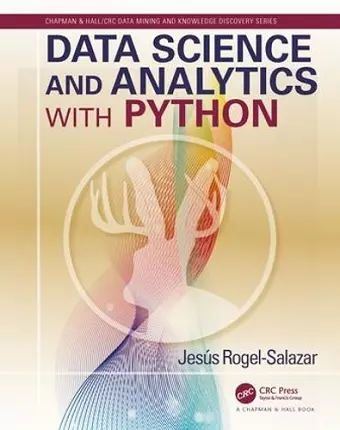Data Science and Analytics with Python
Format:Paperback
Publisher:Taylor & Francis Inc
Published:16th Aug '17
Currently unavailable, and unfortunately no date known when it will be back
This paperback is available in another edition too:
- Hardback£105.00(9781138043176)

Data Science and Analytics with Python is designed for practitioners in data science and data analytics in both academic and business environments. The aim is to present the reader with the main concepts used in data science using tools developed in Python, such as SciKit-learn, Pandas, Numpy, and others. The use of Python is of particular interest, given its recent popularity in the data science community. The book can be used by seasoned programmers and newcomers alike.
The book is organized in a way that individual chapters are sufficiently independent from each other so that the reader is comfortable using the contents as a reference. The book discusses what data science and analytics are, from the point of view of the process and results obtained. Important features of Python are also covered, including a Python primer. The basic elements of machine learning, pattern recognition, and artificial intelligence that underpin the algorithms and implementations used in the rest of the book also appear in the first part of the book.
Regression analysis using Python, clustering techniques, and classification algorithms are covered in the second part of the book. Hierarchical clustering, decision trees, and ensemble techniques are also explored, along with dimensionality reduction techniques and recommendation systems. The support vector machine algorithm and the Kernel trick are discussed in the last part of the book.
About the Author
Dr. Jesús Rogel-Salazar
is a Lead Data scientist with experience in the field working for companies such as AKQA, IBM Data Science Studio, Dow Jones and others. He is a visiting researcher at the Department of Physics at Imperial College London, UK and a member of the School of Physics, Astronomy and Mathematics at the University of Hertfordshire, UK, He obtained his doctorate in physics at Imperial College London for work on quantum atom optics and ultra-cold matter. He has held a position as senior lecturer in mathematics as well as a consultant in the financial industry since 2006. He is the author of the book Essential Matlab and Octave, also published by CRC Press. His interests include mathematical modelling, data science, and optimization in a wide range of applications including optics, quantum mechanics, data journalism, and finance.For advanced students and professionals in data science and data analytics, this work provides an excellent introduction to the main concepts of data analytics using tools developed in Python. The popularity and open source nature of Python makes it an excellent choice for developing analytic models using add-on tools such as SciKit-learn, Numpy, and others. The book does not assume a working knowledge of Python and provides a through introductory chapter. The other chapters can be read independently of one another, making the text a valuable resource for readers interested in a specific area of data analytics. The book's design is user-friendly as well; wide margins allow for taking notes while reading. This space also contains summary notes of the material, making it easy to scan for specific concepts. The material covered includes machine learning and pattern recognition, various regression techniques, classification algorithms, decision tree and hierarchical clustering, and dimensionality reduction. Though this text is not recommended for those just getting started with computer programming, it would make an excellent tool for readers who wish to add Python to their programming language repertoire while developing models or analyzing data.
—D. B. Mason, Albright College, CHOICE, June 2018
For advanced students and professionals in data science and data analytics, this work provides an excellent introduction to the main concepts of data analytics using tools developed in Python. The popularity and open source nature of Python makes it an excellent choice for developing analytic models using add-on tools such as SciKit-learn, Numpy, and others. The book does not assume a working knowledge of Python and provides a through introductory chapter. The other chapters can be read independently of one another, making the text a valuable resource for readers interested in a specific area of data analytics. The book's design is user-friendly as well; wide margins allow for taking notes while reading. This space also contains summary notes of the material, making it easy to scan for specific concepts. The material covered includes machine learning and pattern recognition, various regression techniques, classification algorithms, decision tree and hierarchical clustering, and dimensionality reduction. Though this text is not recommended for those just getting started with computer programming, it would make an excellent tool for readers who wish to add Python to their programming language repertoire while developing models or analyzing data.
—D. B. Mason, Albright College, CHOICE, June 2018
ISBN: 9781498742092
Dimensions: unknown
Weight: 746g
412 pages